- Home
- Fergus Hume
A Coin of Edward VII: A Detective Story Page 19
A Coin of Edward VII: A Detective Story Read online
Page 19
CHAPTER XVIII
WHAT HAPPENED NEXT
Giles left the churchyard slowly, with his brain in a whirl. Anne haddeparted in hot haste, taking shelter in her hiding-place, and he darenot follow unless he wanted it to be discovered. He never knew who itwas, whose footsteps had startled her away. When she left him heremained for quite ten minutes where he was, in a kind of dazedcondition. The footsteps were not heard now. So intent had he been uponAnne's flight, and on the amazing things she had told him, that he hadnot noticed when they ceased. Then it occurred to him that they hadretreated--just as though a person had been listening and had hastilygone away. But of this he could not be sure. All he did know was thatwhen he rounded the corner there was not a soul in sight. And nothingremained but to go home.
Olga and her mother did not put in an appearance on this night, so Gileshad ample time to think over his meeting with Anne. He did not see howhe could help her, and the story she had related bewildered, instead ofenlightening him. After a time he rearranged the details, and concludedthat, in spite of all denial, her father was the guilty person, and thecrime had been committed for the sake of the Powell money.
"Whether the Scarlet Cross indicates a political society or is thesymbol of a thieves' association," said Giles to himself, "I can't sayuntil Steel is more certain of his ground. But this Alfred Denham, orWalter Franklin, or whatever he chooses to call himself, is evidently abad lot. He has sufficient love for his daughter to keep his iniquitiesfrom her, and that is why Anne is so much in the dark. I quite believethat she thinks her father innocent, and saved him on the spur of themoment. But he is guilty for all that."
And then Giles proceeded to work out the case as it presented itself tohim. Walter Franklin--as he found it most convenient to call him--was ascoundrel who preyed on society, and who by some mischance had a pureand good daughter like Anne. To keep her from knowing how bad hewas--and the man apparently valued her affection--he sent her to be agoverness. She believed in him, not knowing how he was plotting to getthe Powell money.
Certainly Walter had resided in Florence under the name of Denham. Warequite believed this, and guessed that he did so in order to keep an eyeon his brother George, who was to inherit the Powell money. Probably heknew beforehand that Powell was ill, and so had feigned death that hemight carry out his scheme without Anne's knowledge. That scheme was toimpersonate his brother; and Giles trembled to think of how he proposedto get rid of George when the time was ripe. He must have intended tomurder him, for since he had slain Daisy with so little compunction, hecertainly would not stick at a second crime.
However, thus Giles argued, the first step to secure the money was forhim to feign death and thus get rid of Anne. Then he came to London, andas Wilson stopped with Mrs. Benker in order to spy on the Ashersthrough Alexander. As soon as he knew for certain that Powell was deadand that the money was coming to Daisy, he came down to Rickwell on theerrand of serving the summons, and then had lured the girl outside ofthe church to kill her. But for Anne following him, he would havedisappeared into the night and no one would have been the wiser.
But the appearance of his daughter in the library upset his plans. Shefollowed him into the church and came out to find him near the deadbody. He certainly made an excuse, but Giles believed that such was alie. If he had confessed to the crime, even Anne might not have stoppedwith him. But here Giles remembered that at the time of the flight Annereally believed that her father was guilty. At all events he had madeuse of her to get away, and thus had reached the yacht at Gravesend. Itwas waiting for him there, in order that he might fly after the crimewas committed. Perhaps he intended to walk to Tilbury, and crossing theThames get on board the yacht before the hue-and-cry was out. Annehampered his plans in some measure and then, by means of the stolenmotor-car, assisted them. Thus the man had got away, and by the murderof the girl had opened the way to George inheriting the money.
"They went to Paris," mused Giles, "then to Florence. I daresay thisWalter intended to send Anne away on some excuse and to murder hisbrother in Florence. Then he could slip into the dead man's shoes, andcome to inherit--as George--the property of Powell. Probably George leftFlorence before Walter arrived, and thus escaped death. He is safe sofar, but how long will he be safe?"
Then a terrible thought occurred to Giles. He wondered if Walter hadplaced his daughter at the Priory so as to have an opportunity of comingto see his brother, and thus seizing his chance of killing him. Anne,innocent as she was of the real meaning of these terrible schemes, mightbe a decoy. If her father came, George would be murdered. Walter, whowas able to disguise himself with infernal ingenuity, might slip intothe dead man's shoes, and thus the money he had schemed for would cometo him. Evidently the last act of the tragedy was not yet played out.
The more Giles puzzled over the matter, the more bewildered he became.He could see--as he thought--what had been done, but he could not guesshow the last act was to be carried out. Yet Walter Franklin was hidingsomewhere waiting to pounce out on his unsuspecting brother, and thesecond crime might involve Anne still deeper in the nefarioustransactions of her father. Finally Giles made up his mind to seekGeorge Franklin at the Priory and tell him what he thought. The manshould at least be put on his guard. It may be said that Ware fancied hemight be permitted to see Anne as a reward for his kind warning.
Before calling on Franklin he went to see the foreign ladies. To hissurprise both had left by the early morning train. There was a note fromOlga, which informed him that her mother had insisted on returning totown, finding the country cold and dull. The note added thatshe--Olga--would be glad to see him at the Westminster flat as soon ashe could come to London, and ended with the remark that he had yet togive his answer to her question. Giles was relieved when he read this.Olga was gone, and the two days of probation were extended indefinitely.He might find some way of releasing Anne before he need give thisdreadful answer. Again and again did he bless the selfishness of theelder Princess, which had removed the obstacle of Olga from his path.
Meanwhile he put her out of his mind and went on to the Priory. Hecalled in on the way to see Morley, but learned that the little man hadgone to town. Mrs. Morley looked more worn and haggard than ever, andseemed about to say something as Giles was taking his leave. However,she held her peace and merely informed him that she missed her childrendreadfully. "But I'm sure that is not what she meant to say," thoughtWare, as he departed. On looking back he saw her thin white face at thewindow and concluded--as Mrs. Parry did--that the poor lady hadsomething on her mind.
In due time he arrived at the Priory and was shown into a gloomydrawing-room, where George Franklin received him. Giles apologized fornot having called before, and was graciously pardoned.
"And, indeed, I should have called on you, Mr. Ware," said Franklin,"but I am such a recluse that I rarely go out."
"You call on Mr. Morley, I believe?"
"Yes; he is a cheery man, and won't take no for an answer. I find thathis company does me good, but I prefer to be alone with my books."
There were many books in the room and many loose papers on the desk,which Giles saw were manuscripts. "I write sometimes," said Franklin,smiling in his sour way. "It distracts my mind from worries. I amwriting a history of Florence during the age of the Renaissance."
"A very interesting period," Giles assured him.
"Yes; and my daughter Portia helps me a great deal. You have met her,Mr. Ware. She told me."
"Yes; we met in the park. She was looking for something, which I found;but I gave it to--to----" Giles hesitated, for he was on dangerousground. "To another lady," he finished desperately, and waited for thestorm to break.
To his surprise the man smiled. "You mean my niece Anne," said he in thecalmest way.
"Yes; I do mean Miss Denham. But I did not know that--that----"
"That I wished you to know she was under my roof. Is that it?"
"Yes," stammered Giles, quite at sea. He did not expect this candor.
/> Franklin rather enjoyed his confusion. "I did not intend to let you knowthat she was here. It was her own request that you were kept inignorance. But since you met her----"
"Did you hear of our meeting?"
"Certainly. Anne told me of it directly she came back. Oh, I have heardall about you, Mr. Ware. My niece confessed that you loved her, and fromMorley I heard that you defended her."
"Did Morley know that Anne was here?"
"Certainly not. At the outset of our acquaintance he informed me that hebelieved her to be guilty. I resolved to say nothing, lest he might tellthe police."
"Why did you not tell him that she was innocent?" asked Giles hotly.
The man looked grave and smoothed his shaven chin--a habit with him whenperplexed. "Because I could not do so without telling an untruth," hesaid coldly.
Giles started to his feet, blazing with anger. "What!" he cried, "canyou sit there and tell me that your own niece killed that poor girl?"
"I have reason to believe that she did," replied Franklin.
"She told me she was innocent," began Ware.
Franklin interrupted. "She loves you too well to say otherwise. But sheis--guilty."
"I would not believe that if she told me herself."
"Sit down, Mr. Ware," said Franklin, after a pause. "I'll explainexactly how the confession came about."
Giles took his seat again, and eyed his host pale but defiant. "It is nouse your saying anything against Anne. She is innocent."
"Mr. Ware, I believed that when she first came to me. I hate my brotherbecause he is a bad man; but I liked his niece, and when she came to mefor shelter I took her in, notwithstanding the enormity of the crimewhich she was accused of having committed."
"It gained you your fortune," said Ware bitterly.
"I would rather have been without a fortune gained at such a price,"answered Franklin coldly; "but I really believed Anne guiltless. Shedefended her father, but I fancied, since she had helped him to escape,that he had killed the poor girl."
"And he did," cried Giles. "I am sure he did."
"He had no motive."
"Oh yes, to get the money--the five thousand a year."
"You forget. By Miss Kent's death that came to me."
"Your brother would have found means to get it. I believe he will findmeans yet."
"I don't understand you. Will you explain?"
Franklin seemed fairly puzzled by Giles' remarks, so the young man setforth the theory he had formed about the murder. At first Mr. Franklinsmiled satirically; but after a time his face became grave, and heseemed agitated. When Giles ended he walked the room in a state ofsubdued irritation.
"What have I done to be so troubled with such a relative as Walter?" hesaid aloud. "I believe you are right, Mr. Ware. He may attempt my lifeto get the money; and as we are rather like one another in appearance hemay be able to pass himself off as me. Why, there was a woman here whocalled herself Mrs. Benker. She insisted that I was called Wilson, underwhich name she knew my brother Walter. So you must see how easily hecould impose on every one. I am dark and clean-shaven; he is red-hairedand bearded. But a razor and a pot of black dye would soon put that torights. Yes, he might attempt my murder. But do not let us saddle himwith a crime of which he is guiltless. Anne killed the girl. I assureyou this is the truth."
"I don't believe it," cried Giles fiercely.
"Nevertheless"--Franklin paused and then came forward swiftly to place asympathetic hand on the young man's shoulder--"I heard her say somyself. She confessed to me that she had met you, and seemed muchagitated. Then she ran out of this room to another. Fearing she was ill,I followed, and found her on her knees praying. She said aloud that shehad deceived you, stating that she could not bear to lose your love byproclaiming herself a murderess."
"No, no; I won't listen." Giles closed his ears.
"Be a man, Mr. Ware. Anne is ill now. She confessed the truth to me, andthen fled to her bedroom. This morning she was very ill, as my daughterPortia assured me. Portia is out of the house. If you will come with me,you will hear the truth from Anne herself. She is so ill that she willnot try to deceive you now. But if she does confess, you must promisenot to give her up to the police. She is suffering agonies, poor child!"
"I'll come at once," said Giles bravely, starting to his feet. And itwas brave of him, for he dreaded the truth. "If she confesses this,I'll go away and never see her again. The police--ah, you needn't thinkI would give her up to the police. But if she is guilty (and I can'tbelieve such a thing of her) I'll tear her out of my heart. But it'simpossible, impossible!"
Franklin looked at him with a pitying smile as he hid his face in hishands. Then he touched him on the shoulder and led the way along apassage towards the back part of the house. At a door at the end hepaused. "The room is rather dark. You won't see her clearly," he said,"but you will know her by her voice."
"I would know her anyway," cried Giles fiercely, and tormented beyondendurance.
Franklin gave him another glance, as though asking him to brace himselffor the ordeal, and then opened the door. He showed small mercy inannouncing Ware's coming. "Anne, here is Mr. Ware come to see you. Tellhim the truth."
The room was not very large, and was enveloped in a semi-gloom. Theblind was pulled down, and the curtains were drawn. The bed was near thewindow, and on it lay Anne in a white dress. She was lying on the bedwith a rug thrown over her feet. When she heard the name of Giles sheuttered a cry. "Keep him away!" she said harshly. "Keep him away! Don'tlet him come!"
"Anne! Anne!" cried Giles, coming forward, his mouth dry, his handsclenched. "Do not tell me that you killed Daisy."
There was a groan and silence, but Anne--so far as he could see--buriedher face in the pillow. It was Franklin who spoke. "Anne, you must tellthe truth once and for all."
"No, no," she cried, "Giles would despise me."
"Anne," he cried in agony, "did you kill her?"
"Yes," came the muffled voice from the bed. "I found her at the grave.My father was not there. He had missed her in the darkness and the snow.She taunted me. I had the stiletto, which I took from the library, and Ikilled her. It was my father who saved me. Oh, go away, Giles, go away!"
But Giles did not go. He rose to his feet and stepped towards thewindow. In a second he had the blind up and the curtains drawn apart.The light poured into the room to reveal--not Anne Denham, but the girlPortia Franklin.

 The Crowned Skull
The Crowned Skull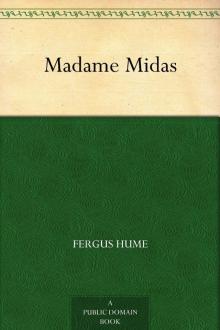 Madame Midas
Madame Midas The Opal Serpent
The Opal Serpent The Solitary Farm
The Solitary Farm The Mystery Queen
The Mystery Queen The Bishop's Secret
The Bishop's Secret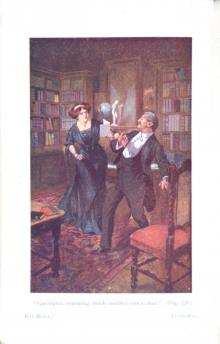 Red Money
Red Money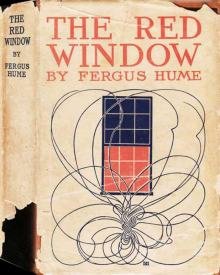 The Red Window
The Red Window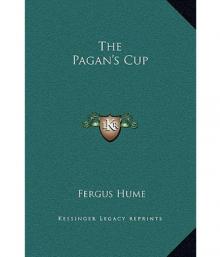 The Pagan's Cup
The Pagan's Cup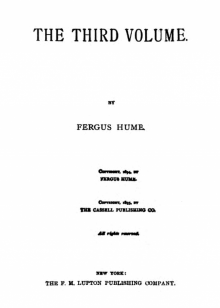 The Third Volume
The Third Volume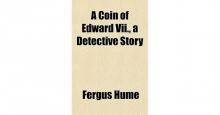 A Coin of Edward VII: A Detective Story
A Coin of Edward VII: A Detective Story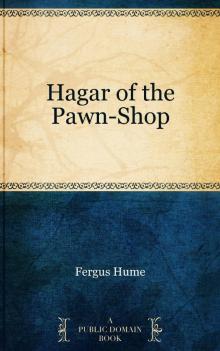 Hagar of the Pawn-Shop
Hagar of the Pawn-Shop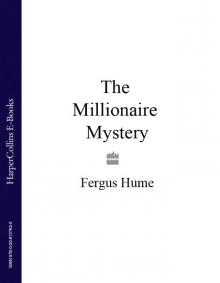 The Millionaire Mystery
The Millionaire Mystery The Mystery of a Hansom Cab
The Mystery of a Hansom Cab